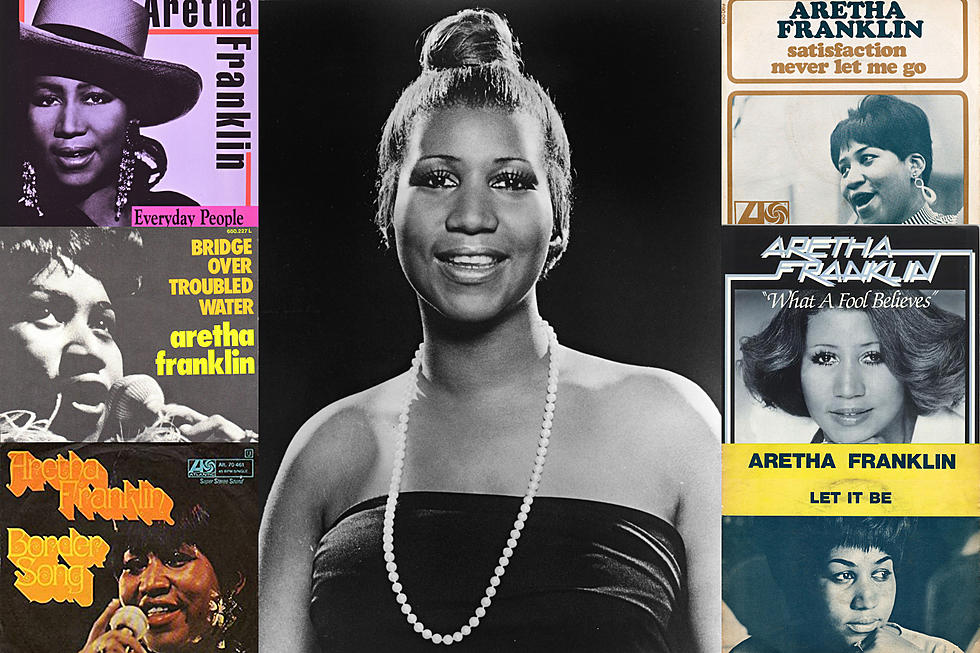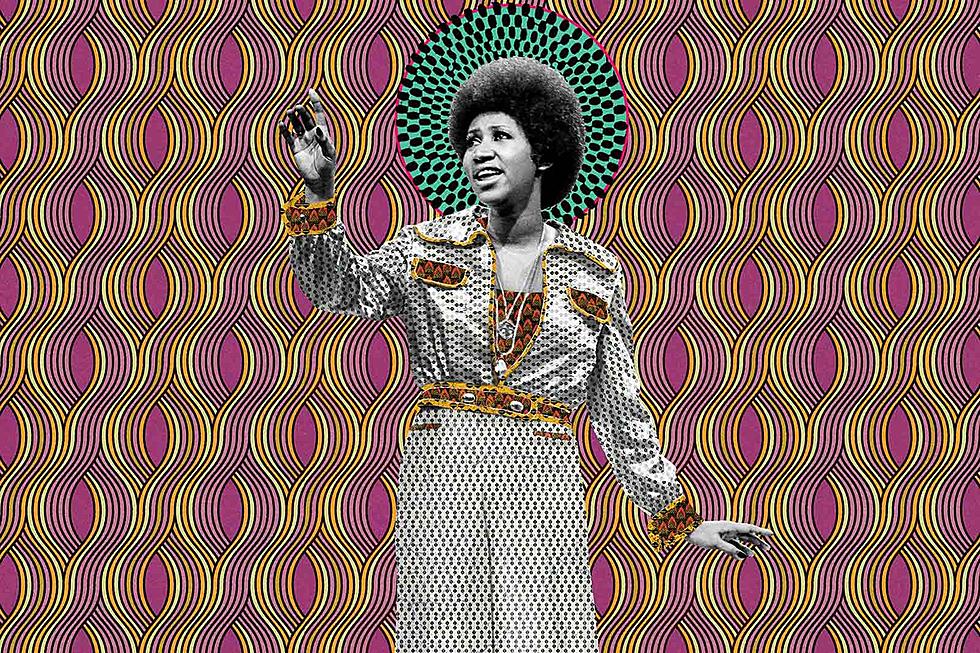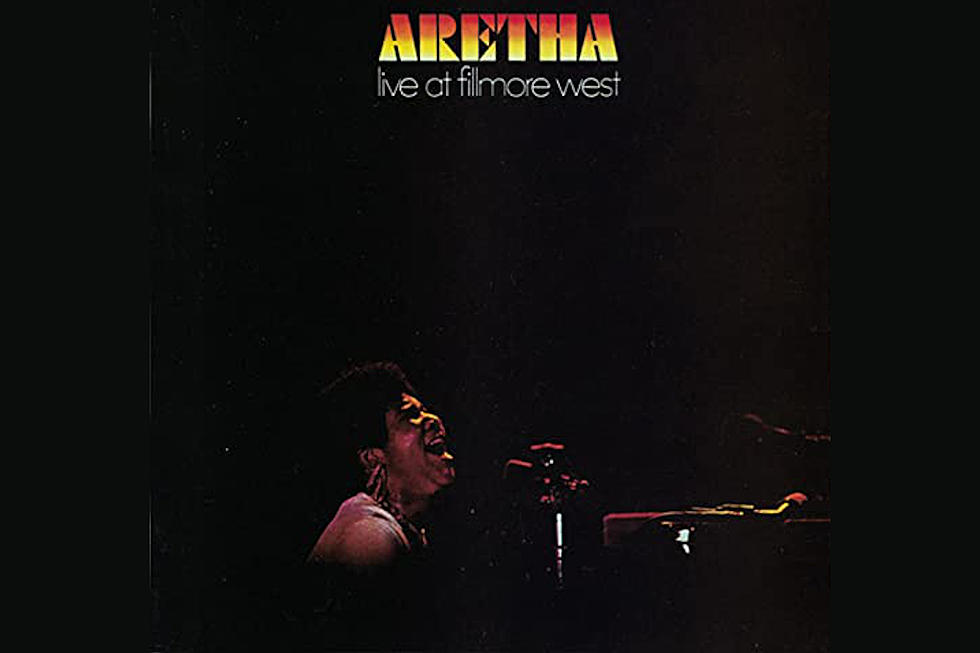
Aretha Franklin’s Most Memorable Rock Covers
The Queen of Soul had an affinity for classic rock, too.
Throughout her 58 years of recording, Aretha Franklin took on the Great American Songbook but really cemented her place in history with R&B and gospel. But the first woman inducted into the Rock & Roll Hall of Fame (in 1987) had big ears, broad tastes and an open mind, and she - in tandem with collaborators such as Jerry Wexler and Clive Davis - would reach far afield with gusto for material from great rock artists, making them her own more often than not with the gospel-rooted soul that informed her best work.
"I like all kinds of music," Franklin told this writer during a 1985 interview at her home in suburban Detroit. "It doesn't have to start as a soul song or a gospel song. It can be rock or jazz or anything. If I hear something in it that I think I can make my own, I'll try it." Journey drummer Narada Michael Walden, who produced and cowrote on five Franklin albums during the '80s and '90s, added after her death in 2018 that Franklin "has no limits. Nothing's out of bounds with her. She had a fire burning inside her that wants greatness, expects greatness and brings greatness to anything she does."
With Franklin's life and career celebrated in the 2021 biopic Respect, it seemed a ripe time to survey some of her most notable adventures in classic rock - in chronological order, including selections that may seem truly surprising on paper.
"(I Can't Get No) Satisfaction"
(Aretha Arrives, 1967)
Franklin kicked off her second album for Atlantic Records with this hit from across the pond. In her hands it's more swinging than defiant, with Muscle Shoals' Swampers adding soulful roadhouse flavor and the King Curtis-led horn section bringing some additional muscle. It's not quite as frenetic as Otis Redding's treatment two years' prior, but it's every bit as tasty.
"96 Tears"
(Aretha Arrives, 1967)
? & the Mysterians seem like a bit of a reach, but Franklin Queen of Souls it up with Tommy Cogbill's walking bass line leading the way. It's one of her few covers that doesn't quite stand up to the original, but it's nothing you'll skip over either.
"Groovin'"
(Lady Soul, 1968)
Franklin gives the Young Rascals' blue-eyed soul smash a loving treatment filled with Muscle Shoals sweetness. It more than holds its own on what some consider to be her finest album, with a cool, slinky guitar line and a buoyant vocal arrangement that includes backup from Cissy Houston and sister Carolyn Franklin.
"Eleanor Rigby"
(This Girl's in Love With You, 1970)
Forget that pretty double string quartet arrangement that stunned the world when the Beatles brought it out in 1966. Franklin revs up her piano-driven celebration like a sequel of sorts to her own "Think," with backing group the Sweet Inspirations making sure the Queen is anything but lonely in the vocal department.
"Let It Be"
(This Girl’s in Love With You, 1970)
There's no drastic revision for the other Beatles cover on Franklin's 16th studio album; Franklin simply taps a bit deeper into the song's soulful underpinning, with a solemn vocal arrangement and a smooth saxophone solo. This was also the first version of the song to be released commercially, as the Beatles' single did not come out until two months after Franklin's.
"The Weight"
(This Girl's in Love With You, 1970)
It's a meeting of the titans as Duane Allman lends slide and steel guitar to Franklin's swinging version of the Band classic - with King Curtis leading the horn attack. It clocks in about 90 seconds shorter than the Music From Big Pink original, but Franklin owns it like it was hers in the first place.
"Love the One You're With"
(Aretha Live at Fillmore West, 1971)
Stephen Stills' first solo hit has received a number of soulful treatments since its 1970 release, but Franklin's was among the first, played six months later during her three-night stand at in San Francisco. It's a galvanizing rendition, sassy and brassy and with genuine spiritual uplift. You will, as she wishes to the Fillmore crowd, enjoy hearing it as much as she and her band like playing it.
"Bridge Over Troubled Water"
(Aretha's Greatest Hits, 1971)
It's okay to let your jaw drop when you hear this - Paul Simon and Art Garfunkel's did, too. Their original single won Record and Song of the Year Grammy Awards in 1971, during the same ceremony where Franklin debuted her spare, hymn-like, Sunday-morning service treatment. Franklin's single went gold and won its own Grammy in 1972, for Best Female R&B Vocal Performance.
"Border Song (Holy Moses)"
(Young, Gifted and Black, 1972)
Give Franklin a song with "Holy" in the title and you can bet she'll take it to church and back - and there again. Elton John's still-fresh (just two years old) track from his self-titled sophomore album was a natural fit for Franklin, and she and her production team smartly kept the arrangement stripped down, focused on her piano and pulpit-caliber vocals featuring the Sweet Inspirations. During the January 2019 Detroit stop on his Farewell Yellow Brick Road tour, John told the crowd he and lyricist Bernie Taupin "were gobsmacked - in fact, we nearly pissed our pants in sheer delight at the fact the woman we loved so much then and grew to love even more afterward would actually record one of our songs." John, who duetted with Franklin on “Through the Storm” from her 1988 album of the same name, added that, "I loved her so much. I used to call her on her birthday sometimes ... to say thank you not just for being Aretha but for every piece of music she made that inspired me."
"The Long and Winding Road"
(Young, Gifted and Black, 1972)
Franklin returned to the Beatles, and to Let It Be, with a soulful, gospelized rendition of the ballad that recalls her cover of Simon & Garfunkel's "Bridge Over Troubled Water." That's Billy Preston on Hammond organ, by the way, a couple of years after he played electric piano on the Beatles' original.
"You've Got a Friend"
(Amazing Grace, 1972)
Carole King's been good for the Queen. Her "(You Make Me Feel Like) A Natural Woman" became one of Franklin's greatest hits back in 1967. King's Tapestry album, meanwhile, was barely six months old when Franklin incorporated "You've Got a Friend" into her legendary Amazing Grace shows at New Temple Missionary Baptist Church in Los Angeles, tagging Jesus the friend in question on this trance-y but uplifting choral treatment paired with the gospel standard "Take My Hand, Precious Lord." James Taylor's definitive version came out just a month before Franklin's performances, but she takes the song somewhere neither he nor King could have imagined.
"A Song for You"
(Let Me in Your Life, 1974)
The Queen is in her emotive glory on this rendition of the oft-recorded Leon Russell favorite. It hails from Donny Hathaway's iconic 1971 version, sharing both a producer (Jerry Wexler) and arranger (Arif Mardin), adding some jazzier inflections to the gospel base Hathaway poured into his rendition.
"What a Fool Believes"
(Aretha, 1990)
Franklin switched labels and made this Doobie Brothers' hit her second single from her debut album for her new home base. She grafts on a smooth vocal opening before picking up the tempo, shifting between a faithful arrangement and a funked-up, dance-floor attack, tossing in a sax solo toward the end. Cowriter Michael McDonald returned the favor by joining Franklin to duet on her 1992 version of Siedah Garrett's "Ever Changing Times."
"You Can't Always Get What You Want"
(Love All the Hurt Away, 1981)
Ever wonder what this Rolling Stones favorite would sound like as a disco-funk workout? We didn't think so - and with good reason. Franklin was searching for direction after her label transition, and this messy Arif Mardin-produced track, featuring Toto members Steve Lukather and David Paich, doesn't find it for her.
"Jumpin' Jack Flash"
(Aretha, 1986)
Keith Richards and Ronnie Wood flew to Detroit to record and film the video for the Whoopi Goldberg film of the same name at legendary United Sound Studios. The all-star crew - including Steve Jordan on drums, Chuck Leavell on keyboards and Randy Jackson on bass - inserted a bit more funk into the mix, and Franklin's fiery performance stands as a highlight of this era in her career.
"Everyday People"
(What You See Is What You Sweat, 1991)
The Sly & the Family Stone classic gets a glossy makeover in Franklin's hands, adding a church shuffle and gospel choir backing vocals for a rolling, swinging ebullience that's the life of the party on her 33rd studio album.
Top 25 Soul Albums of the '70s
More From 92.9 The Lake










